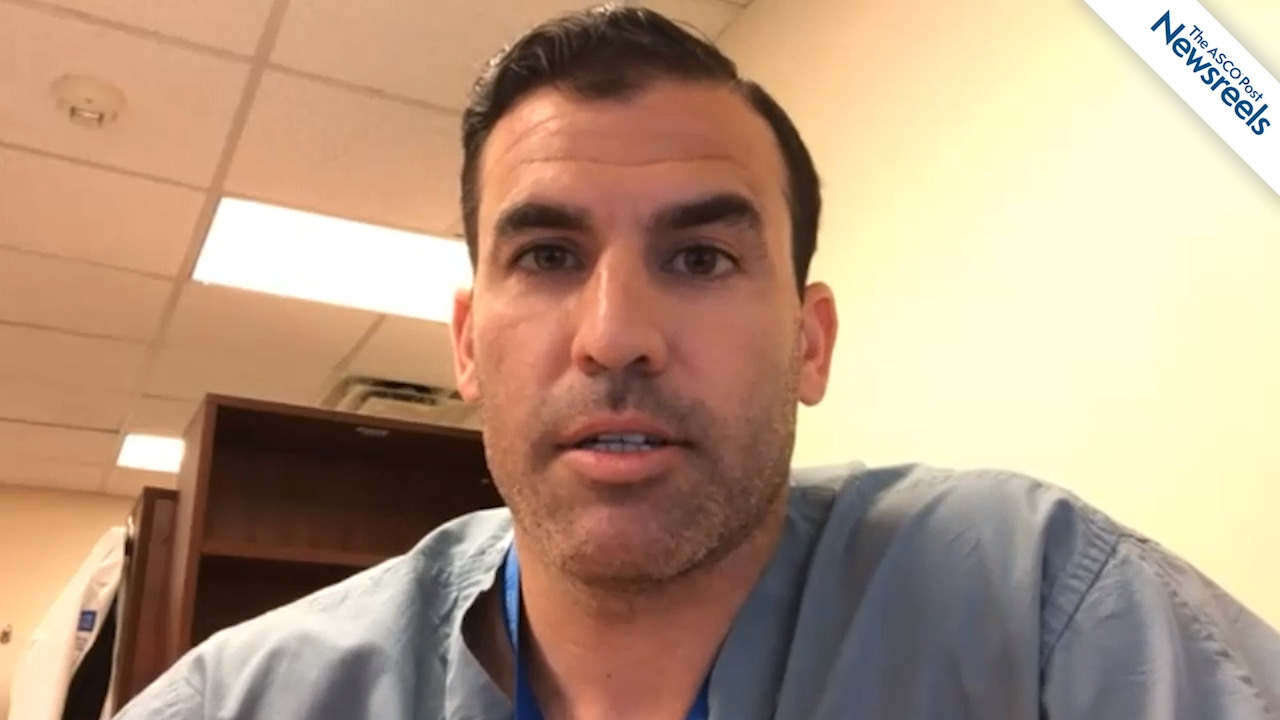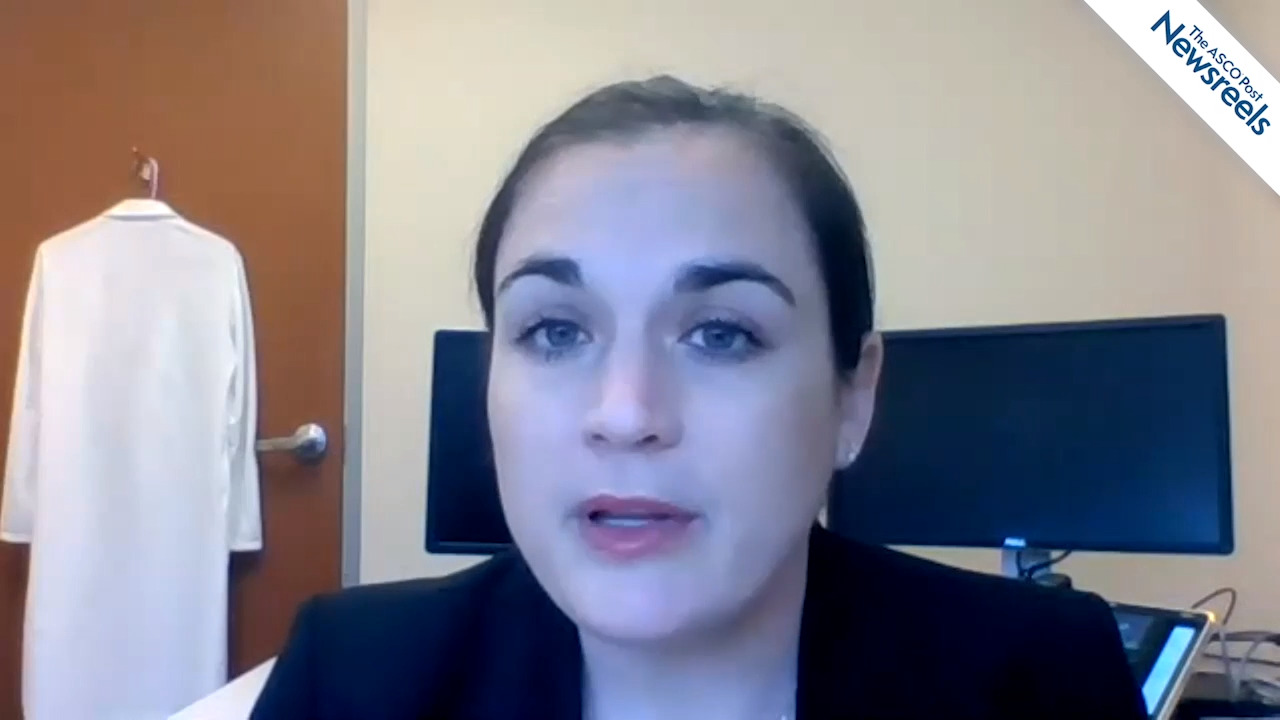SGO 2021 Virtual Annual Meeting on Womens Cancer
Lenvatinib/Pembrolizumab Improves Survival in Advanced Endometrial Cancer in a Phase III Trial
In the first report from the pivotal phase III KEYNOTE-775/Study 309 trial, the combination of lenvatinib, a multikinase inhibitor of VEGFR1, VEGFR2, and VEGFR3 kinases, and the PD-1 inhibitor pembrol...
Hormonal Intrauterine Device Under Study for Managing Early Endometrial Cancer
Disease regression was observed in 82% of women with endometrial hyperplasia with atypia and 43% of women with endometrial cancer after treatment for 6 months with a hormonal intrauterine device, in a...
Benefit of Niraparib Maintenance Therapy Extends Beyond First Disease Progression in Recurrent Ovarian Cancer
The PARP (poly [adp-ribose] polymerase) inhibitor niraparib is safe for long-term use and effective as maintenance treatment in patients with platinum-sensitive recurrent ovarian cancer, according to ...
Niraparib Plus Bevacizumab Shows Clinical Benefit in Advanced Ovarian Cancer
The addition of niraparib maintenance to first-line platinum-based chemotherapy with bevacizumab demonstrated clinical benefit in patients with advanced ovarian cancer, according to data from the OVAR...
5-Year Follow-up of SOLO-1: Sustained Benefit for Maintenance Olaparib in Ovarian Cancer
In the 5-year follow-up of the pivotal SOLO-1 trial in women with newly diagnosed advanced ovarian cancer and a BRCA1/2 mutation, maintenance treatment with olaparib led to a more than doubling in pro...
Phase III ARIEL4 Trial Evaluates Rucaparib’s Benefit in BRCA-Mutated Relapsed Ovarian Cancer
In patients with BRCA-mutated, advanced, relapsed ovarian cancer, treatment with the PARP (poly [ADP-ribose] polymerase) inhibitor rucaparib led to a significant improvement in progression-free surviv...
Fuzuloparib Maintenance Therapy Improves Progression-Free Survival in Patients With Recurrent Ovarian Cancer
A new poly (ADP-ribose) polymerase (PARP) inhibitor could soon be joining an already crowded treatment landscape in ovarian cancer, according to data presented at the Society of Gynecologic Oncology (...
Survey Finds Bullying, Sexual Harassment Not Uncommon for Women in Gynecologic Oncology
Female gynecologic oncologists have reported in a survey that having a department chair of the same gender is no buffer against gender harassment or discrimination in the workplace. The information co...
Expert Point of View: Thomas Herzog, MD
Discussant of the abstract on this novel algorithm, Thomas Herzog, MD, Deputy Director of the University of Cincinnati Cancer Institute and Professor of Obstetrics and Gynecology at the UC College of ...
Could Risk-Based Triage System Alter Surgical Practice in Ovarian Cancer?
A simple, risk-assessment algorithm may change practice when it comes to selecting patients with advanced ovarian who can tolerate complex primary debulking surgery, according to data presented during...
Frailty Can Be a Serious Issue in Ovarian Cancer
Frailty is a better predictor than age of poor outcomes in patients with ovarian cancer, according to studies reported at the Society of Gynecologic Oncology (SGO) 2021 Virtual Annual Meeting on Women...
Expert Point of View: Thomas Herzog, MD
The discussant of the fuzuloparib abstract at the Society of Gynecologic Oncology meeting was Thomas Herzog, MD, Deputy Director of the University of Cincinnati (UC) Cancer Center and Professor of Obs...
Fuzuloparib Maintenance Therapy Improves Progression-Free Survival in Patients With Recurrent Ovarian Cancer
A new poly (ADP-ribose) polymerase (PARP) inhibitor could soon be joining an already crowded treatment landscape in ovarian cancer, according to data presented at the Society of Gynecologic Oncology (...
Study Finds Ixabepilone Plus Bevacizumab Active in Platinum-Resistant or Recurrent Ovarian Cancer
The addition of bevacizumab to ixabepilone could be a promising treatment strategy for a group of patients with cancer currently lacking therapeutic options, according to data presented during the vir...
Expert Point of View: Ursula Matulonis, MD, and Konstantin Zakashansky, MD
Perspectives on ARIEL4 were provided for The ASCO Post by the invited discussant Ursula Matulonis, MD, Professor of Medicine, Harvard Medical School, and Chief of Gynecologic Oncology and the Brock Wi...
Phase III ARIEL4 Confirms Rucaparib’s Benefit in BRCA-Mutated Relapsed Ovarian Cancer
In patients with BRCA-mutated, advanced, relapsed ovarian cancer, treatment with the PARP (poly [ADP-ribose] polymerase) inhibitor rucaparib led to a significant improvement in progression-free surviv...
Expert Point of View: Angeles Alvarez Secord, MD
The invited discussant of the phase II feMMe trial1 was Angeles Alvarez Secord, MD, Professor of Obstetrics and Gynecology, Duke University School of Medicine, Durham, North Carolina. She noted that, ...
Hormonal Intrauterine Device Under Study for Managing Early Endometrial Cancer
Disease regression was observed in 82% of women with endometrial hyperplasia with atypia and 43% of women with endometrial cancer after treatment for 6 months with a hormonal intrauterine device in a ...
5-Year Follow-up of SOLO-1: Sustained Benefit for Maintenance Olaparib in Ovarian Cancer
In the 5-year follow-up of the pivotal SOLO-1 trial in women with newly diagnosed advanced ovarian cancer and a BRCA1/2 mutation, maintenance treatment with olaparib led to a more than doubling in pro...
Expert Point of View: Ursula Matulonis, MD
Invited discussant, Ursula Matulonis, MD, Chief of the Division of Gynecologic Oncology at Dana-Farber Cancer Institute, Boston, applauded the improved outcomes favoring lenvatinib/pembrolizumab in t...
Lenvatinib/Pembrolizumab Improves Survival in Advanced Endometrial Cancer
In the first report from the pivotal phase III KEYNOTE-775/Study 309 trial, the combination of lenvatinib, a multikinase inhibitor of VEGFR1, VEGFR2, and VEGFR3 kinases, and pembrolizumab significantl...
Anthony B. Costales, MD, on Advanced Ovarian Cancer: Predicting the Benefits of Minimally Invasive Surgery
Anthony B. Costales, MD, of the Baylor College of Medicine, discusses results from the MIID-SOC trial, which explored the question of whether laparoscopic surgery for removal of ovarian, fallopian tub...
Studies Presented at SGO Annual Meeting Examine Racial Health-Care Disparities in Patients With Gynecologic Cancers
Two studies presented at the Society of Gynecologic Oncology (SGO) 2021 Annual Meeting on Women’s Cancer highlighted the importance of addressing racial inequities in gynecologic cancers, including im...
Andreas Obermair, MD, on Treating Endometrial Adenocarcinoma With a Levonorgestrel Intrauterine Device
Andreas Obermair, MD, of the University of Queensland and Queensland Centre for Gynaecological Cancer Research, discusses data on a hormonal IUD used to treat women with the precursor lesion endometri...
Amir A. Jazaeri, MD, on Metastatic Cervical Cancer: The Role of Immunotherapy
Amir A. Jazaeri, MD, of The University of Texas MD Anderson Cancer Center, discusses data on the safety and efficacy of adoptive cell transfer using autologous tumor-infiltrating lymphocytes (LN-145) ...
Eric Pujade-Lauraine, MD, PhD, on First-Line Maintenance Therapy in Ovarian Cancer
Eric Pujade-Lauraine, MD, PhD, of Hôpital Hôtel-Dieu, discusses results from the PAOLA-1ENGOT-ov25 trial on the use of homologous recombination–repair mutation gene panels and whether they can predict...
Brittany A. Davidson, MD, on a Model to Predict the Need for Opioids After Gynecologic Surgery
Brittany A. Davidson, MD, of Duke University, discusses the development and validation of the GO-POP model (Gynecologic Oncology Predictor of Postoperative opioid use), an individualized patient-cente...
Dana M. Roque, MD, on Ovarian, Fallopian Tube, and Peritoneal Cancers: Possible New Therapeutic Option for Heavily Pretreated Disease
Dana M. Roque, MD, of the University of Maryland Medical Center, discusses phase II results showing that weekly ixabepilone plus biweekly bevacizumab may improve overall response rate as well as progr...
Laura Chambers, DO, on Treating Epithelial Ovarian Cancer With Cisplatin and Paclitaxel During Surgery
Laura Chambers, DO, of the Cleveland Clinic, discusses data showing that combining paclitaxel and cisplatin vs cisplatin alone with hyperthermic intraperitoneal chemotherapy at interval debulking surg...
Supriya Chopra, MD, on Cervical Cancer: Reducing Late Effects of Bowel Toxicity
Supriya Chopra, MD, of Tata Memorial Centre, discusses a final analysis of the phase III PARCER trial, which showed that image-guided intensity-modulated radiotherapy is superior to conventional radio...
Lauren Thomaier, MD, on Predicting Chemotherapy-Induced Peripheral Neuropathy in Gynecologic Cancer Survivors
Lauren Thomaier, MD, of the University of Minnesota, discusses the genetic variants found to be associated with an increase in chemotherapy-induced neuropathy symptoms in a cohort of gynecologic canc...
Emily Hinchcliff, MD, MPH, on Treating Non–Clear Cell Ovarian Cancer With Durvalumab and Tremelimumab
Emily Hinchcliff, MD, MPH, of The University of Texas MD Anderson Cancer Center, discusses phase II results of durvalumab (anti–PD-L1) and tremelimumab (anti–CTLA-4) administered in combination vs seq...
Sandro Pignata, MD, PhD, on BRCA-Mutated Ovarian Cancer: Maintenance Olaparib Outcomes
Sandro Pignata, MD, PhD, of the Istituto Nazionale dei Tumori, discusses results from the ORZORA trial, which showed the efficacy of olaparib in patients with platinum-sensitive relapsed ovarian cance...
Alice P. Barr, MD, on Advanced Ovarian Cancer: Minimally Invasive vs Open Surgery After Chemotherapy
Alice P. Barr, MD, of the Carolinas Medical Center and Levine Cancer Institute, discusses results from a retrospective study, which showed that progression-free and overall survival appeared to be no ...
Image-Guided Intensity-Modulated Radiotherapy in Patients With Cervical Cancer
Treatment with image-guided intensity-modulated radiotherapy (IG-IMRT) led to reduced late toxicities vs standard three-dimensional (3D) conformal radiotherapy in patients with cervical cancer, accord...
Niraparib Plus Bevacizumab Shows Clinical Benefit in Patients With Advanced Ovarian Cancer
The addition of niraparib maintenance to first-line platinum-based chemotherapy with bevacizumab demonstrated clinical benefit in patients with advanced ovarian cancer, according to data from the OVAR...
Charles N. Landen, MD, on Newly Diagnosed Ovarian Cancer: BRCA Mutations, PD-L1 Expression, and Combination Chemoimmunotherapy
Charles N. Landen, MD, of the University of Virginia, discusses results from the first clinical trial in ovarian cancer to demonstrate that neither a BRCA1/2 mutation nor a homologous recombination de...
Hyun C. Chung, MD, on Pembrolizumab for Advanced Cervical Cancer: Update From KEYNOTE-158
Hyun C. Chung, MD, of Yonsei Cancer Center and Yonsei University College of Medicine, discusses phase II findings from the KEYNOTE-158 study, which support the use of pembrolizumab for patients with r...
Hormonal IUD May Be a Potential Nonsurgical Treatment for Early Endometrial Cancer or Precancer
An intrauterine device, or IUD, that releases the hormone levonorgestrel appears to be an effective treatment for endometrial precancer and early-stage endometrial cancer, according to new study resul...
Shannon N. Westin, MD, on Treating Endometrial Cancer With Enzalutamide, Paclitaxel, and Carboplatin
Shannon N. Westin, MD, of The University of Texas MD Anderson Cancer Center, discusses phase II results from the ENPAC trial, which showed the combination of enzalutamide, paclitaxel, and carboplatin ...
Maintenance Olaparib Yields Strong and Sustained Benefit in Ovarian Cancer
In the 5-year follow-up of the pivotal SOLO-1 trial in women with advanced ovarian cancer and a BRCA1/2 mutation, maintenance treatment with olaparib led to a doubling in progression-free survival. Wi...
Ursula A. Matulonis, MD, on Ovarian Cancer: Niraparib as Maintenance Therapy
Ursula A. Matulonis, MD, of Dana-Farber Cancer Institute, discusses phase III results from the ENGOT-OV16/NOVA study on the long-term safety and efficacy of niraparib as maintenance therapy in patient...
Benefit of Niraparib Maintenance Therapy Extends Beyond First Disease Progression in Recurrent Ovarian Cancer
The PARP (poly [ADP-ribose] polymerase) inhibitor niraparib is safe for long-term use and effective as maintenance treatment in patients with platinum-sensitive recurrent ovarian cancer, according to ...
Phase III ARIEL4 Trial Confirms Benefit of Rucaparib in BRCA-Mutated Relapsed Ovarian Cancer
In patients with BRCA-mutated, advanced, relapsed ovarian cancer, treatment with the PARP (poly [ADP-ribose] polymerase) inhibitor rucaparib led to a significant improvement in progression-free surviv...
Frailty May Impact Surgical Outcomes in Patients With Ovarian Cancer
Frailty may be a better predictor of poor surgical outcomes in patients with ovarian cancer than age, according to two studies reported at the Society of Gynecologic Oncology (SGO) 2021 Virtual Annual...
Morcos N. Nakhla, MS, on Surgical Outcomes for Frail Patients With Ovarian Cancer
Morcos N. Nakhla, MS, a second-year student at the David Geffen School of Medicine at UCLA, discusses data showing that a higher surgical volume is associated with better outcomes for frail patients u...
Brian M. Slomovitz, MD, on the Impact of COVID-19 on Gynecologic Cancer Research
Brian M. Slomovitz, MD, of Florida International University, describes how emphasizing diversity and shifting away from clinical trials at universities helped The GOG Foundation, Inc., increase patien...
Edward L. Trimble, MD, MPH, on Cervical Cancer: A Global WHO Initiative
Edward L. Trimble, MD, MPH, of the National Cancer Institute, discusses the World Health Organization’s global strategy to speed the elimination of cervical cancer through vaccination, screening, trea...
William H. Bradley, MD, on Ovarian Cancer: 5-Year Follow-up on Maintenance Olaparib
William H. Bradley, MD, of the Medical College of Wisconsin, discusses results from the SOLO-1 trial on maintenance olaparib after first-line platinum-based chemotherapy for patients with newly diagno...
Recent Chemotherapy or Immunotherapy for Gynecologic Cancer Does Not Raise Risk of Death Due to COVID-19
Although some studies show that patients with cancer have a greater risk of health complications from COVID-19, a new study has found that recent chemotherapy or immunotherapy for gynecologic cancer d...




















